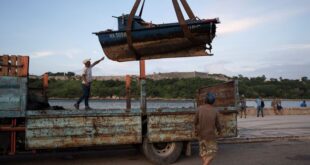BUENOS AIRES (Reuters) – Argentines will vote on Sunday in primary elections that will determine the final candidates for a presidential ballot in October and give a clear gauge on the likely final result as the country battles against a swirling economic crisis.
The polls will open at 8 a.m. (1100 GMT) with results coming in from 9 p.m. (0000 GMT). All candidates need a minimum 1.5% of the vote to be eligible for the general election, while the two main political blocs face internal leadership battles.
Here are the main candidates.
SERGIO MASSA
The current Minister of Economy, Massa is the main ‘unity’ candidate for the Peronist coalition’s Union por la Patria grouping and the distant favorite to win its nomination despite inflation hitting 116% and reserves dwindling under his watch.
A pragmatist and deal maker, Massa, 51, represents the centrist wing of Peronism, Argentina’s main political force for decades, though has a mixed relationship with the powerful left-wing of the coalition, despite getting its eventual backing.
Massa is the single most popular candidate in most opinion polls, though his Peronist coaltion is overall seen just behind the main conservative opposition bloc.
PATRICIA BULLRICH
Bullrich, 67, a former security minister, represents the more conservative wing of the center-right Together for Change coalition. She is pledging tough austerity measures to stabilize the economy and a tough-on-crime law and order approach.
Bullrich, who faces a fight in the primaries against moderate rival Buenos Aires Mayor Horacio Larreta, wants to quickly remove capital controls, cut spending to tackle inflation and lower taxes on farm exports, Argentina’s top economic engine.
HORACIO LARRETA
Larreta, 57, the two-term mayor of Buenos Aires city, is a moderate voice within the Together for Change coalition, and has the backing from several key groups within the bloc. He is competing with Bullrich for the nomination.
A Harvard-educated economist, Larreta is pledging deregulation of markets and to balance the public budget, though prefers a dialogue-led and more gradual approach to avoid sparking off more economic crisis.
JAVIER MILEI
With tousled hair, histrionics and regular diatribes against the “thieving” political elite, Milei is the biggest political surprise in recent years in Argentina, being propelled by voters disenchanted with the political status quo.
The 52-year-old economist, who often sports leather jackets and sings rock songs at his boisterous political rallies, has proposed to dollarize the economy, shutter the central bank and eradicate various ministries to shrink the state.
JUAN GRABOIS AND JUAN SCHIARETTI
Grabois, 40, a lawyer and labor activist, will compete with Massa for main Peronist nomination but lags well behind in polls. Schiaretti, 74, a regional governor, is a moderate with ties to Peronism running for a coalition of smaller parties.
(Reporting by Maximilian Heath; Editing by Nicolas Misculin and Diane Craft)
 BeritaKini.biz Berita Viral Terkini di Malaysia
BeritaKini.biz Berita Viral Terkini di Malaysia





